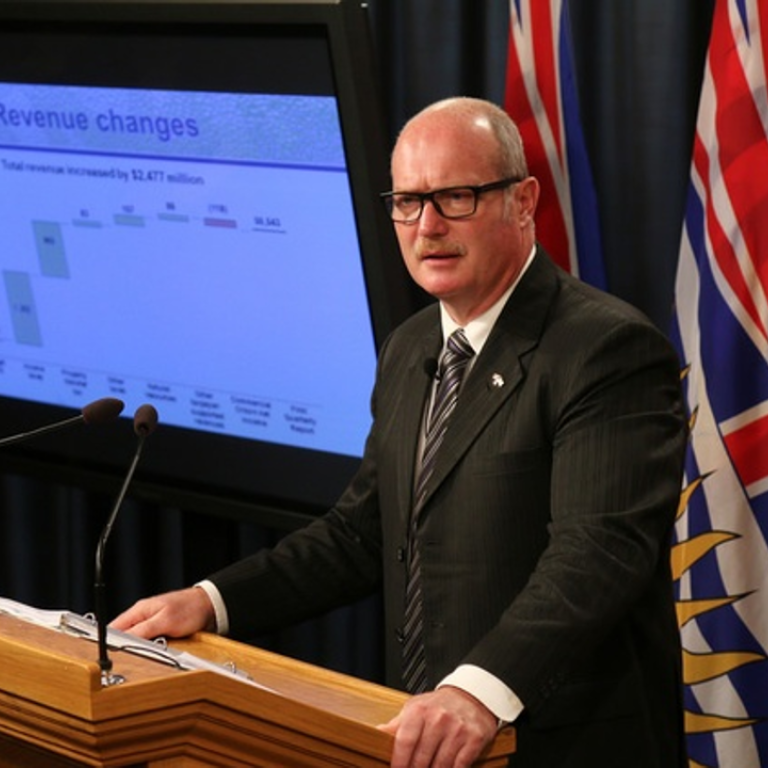
Income and real estate taxes help bump up British Columbia surplus
Bus pass clawback for disabled remains as provincial Finance Minister Mike de Jong releases province’s first-quarter budget update
The BC Liberal government got a tax windfall from the overheated Metro Vancouver real estate market and has plowed some of that money into what NDP critic Carole James calls the “imaginary fund.”
Finance Minister Mike de Jong’s first-quarter budget update Thursday included a C$400 million (US$304 million) deposit to the so-called Prosperity Fund, seven months after seeding it with C$100 million (US$76 million).
When it was announced in the 2013 pre-election throne speech, the fund was supposed generated strictly from proceeds of liquefied natural gas sales. The government claimed it could grow to be C$100 billion (US$76 billion) and help erase the provincial debt, but a global demand slump has delayed plans for a BC industry.
“It really is a slush fund for the government going into the election,” James said.
Jordan Bateman, BC Director of the Canadian Taxpayers’ Federation, said a better use of the C$400 million deposit would have been reducing BC’s C$66.5 billion (US$50.6 billion) debt, which is C$21 billion (US$16 billion)worse since Christy Clark assumed the premiership in March 2011.
“That money should go directly on the debt, that reduces debt servicing costs and then that saves more money down the road,” Bateman said.
At the September 15 budget update, De Jong forecast a C$1.9 billon (US$1.4 billion) budget surplus for the year ending March 31, 2017, substantially higher than the original C$264 million (US$201 million) forecast. The fiscal year ends before the May 9, 2017, election, but the final report won’t be released until next July.
The better forecast is driven by a C$1.1 billion (US$837 million) increase in personal income tax revenue and C$965 million (US$734 million) from the property transfer tax.
“I’m surprised they were out a billion dollars on income tax, because that’s considered the most stable form of funding for government,” Bateman said.
“More people working, more people earning wages,” de Jong said. “The growth and benefits of that are spread across economic activity. They are spread geographically as well. that is not to say there are not still areas of the province that are struggling and there are not still families that are struggling.”
De Jong said the government is “in a better position” to consider raising payments and support to British Columbians in need but ruled out cancellation of the controversial February decision to scrap the annual C$45 (US$34) bus pass for 35,000 people with disabilities. Beginning September 1, they received a C$77-a-month (US$59) raise in benefits to C$983 per month (US$748), but must pay C$52 (US$39.55) per month for a bus pass that previously cost C$45 for a year. About 10 per cent have opted out.
“They’re exercising a new-found freedom and choice that heretofore didn’t exist,” de Jong said. “So that was the whole purpose of the exercise: to give people choice.”
A May open letter to Clark from the BC Disability Alliance said it would be “difficult not to opt to put the C$77 (US$59) each month toward previously unmet needs like food or rent.” It added that the measure would result in greater isolation for vulnerable people.
De Jong also announced a freeze in medical service plan premiums, which would save the average adult C$3 (US$2.28) a month in 2017. Last month, the government announced a C$3.50-a-month (US$2.66) hike to ICBC rates. Add in college and university tuition hikes and BC Hydro rate increases, and James called BC “the most unaffordable place around.”
Bateman said the government deserves no praise after raising medical insurance rates for 15 years.
“It does tell you the economy is performing better, but gimmicks like freezing the MSP [are] irrelevant to the average taxpayer,” he said. “We want to see substantial change to the MSP tax system, we want to see it scrapped.”
The quarterly report said that BC’s population is expected to hit 4.8 million next year. The province’s population grew 1 per cent from January to March, with net inflow of 12,493. Of those, 7,426 (59 per cent) were from other countries.
De Jong said the next report on real estate purchases by foreigners is set for release next week and will include August, the first month of the new 15 per cent tax on foreign buyers in Metro Vancouver.
“No one knows for certain what the impact of the tax and other market forces and other measures will be on the real estate market,” de Jong said. “August was not a normal month. A lot of transactions were moved up in advance of the date. We know that in terms of volumes at the land titles office.”

